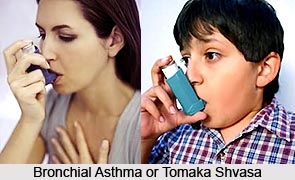 Bronchial asthma is known as Tomaka Shvasa in Ayurveda. In the present days with increasing levels of pollution and the stressful lifestyle followed by people, bronchila asthma is a common term. It is present in many people`s life.
Bronchial asthma is known as Tomaka Shvasa in Ayurveda. In the present days with increasing levels of pollution and the stressful lifestyle followed by people, bronchila asthma is a common term. It is present in many people`s life.
The word `asthma` is derived from a Greek word which means `panting` or `laboured breathing`. Asthma is a condition characterized by a paroxysmal wheezing dyspnoea i.e. difficulty in breathing, mainly expiratory.
Causes and Symptoms
Bronchial asthma is supposed to originate from troubles of the stomach and the gastro-intestinal tract. That is why in the preliminary stage of the disease or just before its onset, the patient complains of indigestion, constipation, or diarrhoea. The attack of asthma may come without warning because of the hypersensitivity of the patient to certain substances like pollen, dust, emissions from certain animals like dogs and cats, certain foods to which the person is allergic and, most important, certain bacteria. Asthma is characterized by difficulty in breathing, a sense of tightness, constriction around the chest, and a wheezing noise as the breath is expelled. The small bronchial tubes which connect with the lungs are constricted due to swelling or accumulation of viscid phlegm in the main bronchi, hence the difficulty in inspiration and expiration.
The attack of asthma comes on in the early morning when the patient suddenly wakes up with a feeling of apprehension and alarm. He sits up as the breathing suddenly becomes impossible in a recumbent position. He may rush to open the window as it becomes difficult to breathe in a closed room. The attack may last for a few hours or a few days before it subsides. In the early stages of the disease, the patient feels normal after the attack. It is only when it becomes chronic that he acquires a typical asthmatic looking i.e. a pale face and an emaciated body.
Medicines and Prescriptions
Well-known preparations for this disease in Ayurveda are Chyavanaprash and Agastya Rasayana. The main ingredient of the former medicine is amla and this is the richest source of Vitamin C in nature. A peculiarity of this fruit is that its vitamin content is not lost by exposure to heat as is the case with other drugs and fruits. The latter preparation is indicated in cases of asthma where the patient is constipated. In particularly emaciated sufferers, however, Chyavanaprash is the better remedy. Both the drugs can be taken in one-teaspoonful doses thrice a day, preferably before food is ingested. They are slow-acting remedies but are surer in their efficacy. In chronic cases, their effect is evident from the increasing gap between successive attacks.
Along with the preparations mentioned above, Sitopaladi Churna should be taken thrice or four times a day in one teaspoonful doses with honey. Since the drug is likely to cause irritation of the throat, it is better when mixed with honey and taken as linctus.
Medicines containing minerals, which are recommended in cases of asthma, can be mentioned as Swasha-Kasa-Chintamani Rasa, Suvarna-Pushpasuga Rasa, and Kanakasava. The dosage and duration of these medicines will depend upon the severity of the disease.
Any of the following prescriptions can be tried with the advice of the physician:
Vasa Churna, Shukti Trikuti Churna and Trikuti Churna
2 gm of Vasa Churna, 125 mg of Shukti Bhasma, and 1 gm Trikuti Churna should be taken thrice daily with honey.
Old Gur and Mustard Oil
10 gm each of old Gur and Mustard oil should be taken daily.
Bharangi and Nagara
2 gm each of Bharangi and Nagara should be grounded into a paste with water and taken twice daily with warm water.
Diet and Other Regimen
The patient is advised to avoid curd, buttermilk, bananas, guavas, and fried foods. Light food should be taken at night and all sour substances should be banned. Smoking is advised to quit and consumption of liquor should be reduced to the minimum. Excessive physical exercise and exposure to cold and damp should be avoided.




